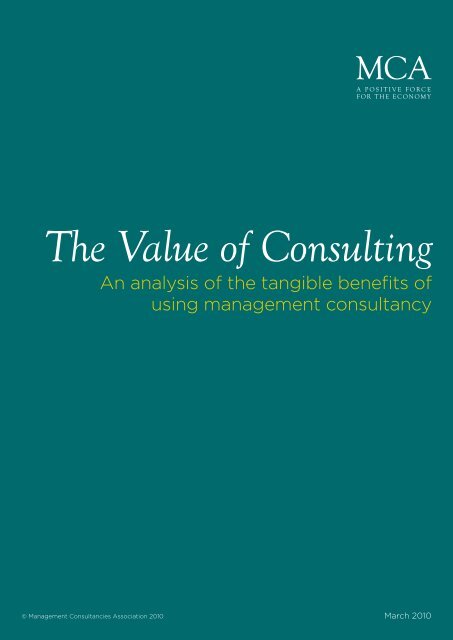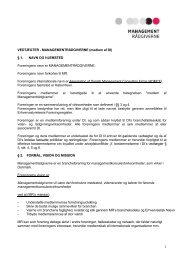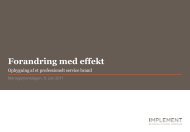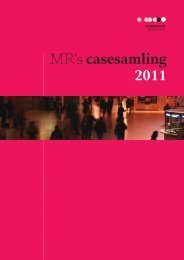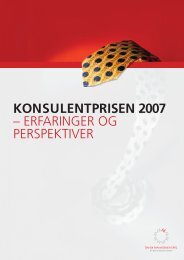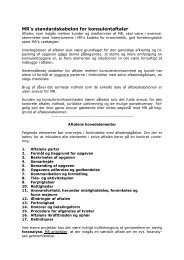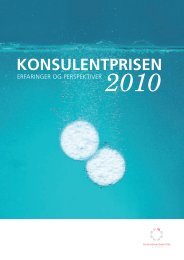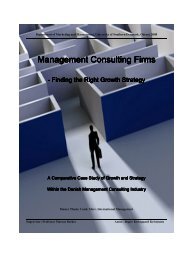The Value of Consulting
The Value of Consulting
The Value of Consulting
Create successful ePaper yourself
Turn your PDF publications into a flip-book with our unique Google optimized e-Paper software.
<strong>The</strong> <strong>Value</strong> <strong>of</strong> <strong>Consulting</strong><br />
An analysis <strong>of</strong> the tangible benefits <strong>of</strong><br />
using management consultancy<br />
© Management Consultancies Association 2010<br />
March 2010
2 <strong>The</strong> <strong>Value</strong> <strong>of</strong> <strong>Consulting</strong><br />
CONTENTS<br />
Foreword 3<br />
Executive summary 4<br />
<strong>The</strong> definition <strong>of</strong> management consultancy and how it is used 5<br />
Research methodology 7<br />
How much does the consulting industry contribute to the UK economy? 8<br />
How satisfied are clients with the work <strong>of</strong> consulting firms? 9<br />
What value do consultants add to clients? 10<br />
Next steps 11<br />
About the MCA and this report<br />
<strong>The</strong> Management Consultancies Association (MCA) is the trade body<br />
for the UK’s management consulting industry. Between them, our sixty<br />
members employ 40,000 consultants, comprise 70% <strong>of</strong> the UK’s £9 billon<br />
consulting industry and work with 90 <strong>of</strong> the FTSE 100 firms, as well as<br />
almost all government departments.<br />
This report outlines the findings <strong>of</strong> a year-long research programme<br />
the MCA undertook in 2009 to establish the tangible benefits <strong>of</strong> using<br />
management consultancy. After spending substantial time developing<br />
a robust and objective methodology, the research quantified the value<br />
consultants add, both in conventional economic terms and in relation to<br />
the value created for clients. <strong>The</strong> report focuses on what the research<br />
revealed in answer to the three key questions the MCA sought to answer.<br />
To register for the MCA’s <strong>Value</strong> <strong>of</strong> <strong>Consulting</strong> updates visit<br />
www.mca.org.uk/value/subscribe<br />
www.mca.org.uk
FOrEwOrd<br />
<strong>The</strong> <strong>Value</strong> <strong>of</strong> <strong>Consulting</strong> 3<br />
<strong>The</strong> use <strong>of</strong> management consultancy is an accepted business practice in many<br />
sectors. Indeed, the UK industry, recently described by a government-sponsored<br />
report as a ‘world leader’, generated fee income <strong>of</strong> around £9 billion in 2008;<br />
there is clearly considerable demand for their services.<br />
But the focus <strong>of</strong> public discussion continues to be on the cost <strong>of</strong> consultancy;<br />
there has been very little research or analysis <strong>of</strong> the value that this can generate<br />
– either for individual clients or the economy as a whole. This report seeks to<br />
address that gap.<br />
<strong>The</strong> <strong>Value</strong> <strong>of</strong> <strong>Consulting</strong> presents the findings <strong>of</strong> a pioneering research programme<br />
to quantify the value consultants add. <strong>The</strong> data it relies on all come from client<br />
organisations which use consultants. We have also been careful not to make<br />
exaggerated or generous assumptions. While our findings necessarily cannot be<br />
comprehensive, they suggest strongly that the UK consulting industry is delivering<br />
significant value to its clients.<br />
We are extremely grateful to all those who helped us and contributed to the research, particularly Fiona Czerniawska, the<br />
MCA’s Head <strong>of</strong> Research. She was ably assisted by a working group comprising partners and directors from MCA member<br />
and non-member firms, and Tim Morris, Pr<strong>of</strong>essor <strong>of</strong> Management Studies at Oxford University, who was instrumental in<br />
developing the research methodology.<br />
I hope that the publication <strong>of</strong> our findings will have two effects.<br />
First, this way <strong>of</strong> thinking about consultancy will help consultancies to engage in the sort <strong>of</strong> dialogue they need to have<br />
with their clients, and help clients to be demanding and intelligent customers.<br />
And, second, I believe that we must now reshape the conversation about consulting. We should look at the benefits as well<br />
as the costs and think <strong>of</strong> the value as well as the price. In practice, many clients already do this when they plan, commission<br />
and review their work with consultants. As a country, we should follow their lead – it will lead to better decision making,<br />
in all sorts <strong>of</strong> places.<br />
Alan Leaman<br />
Chief Executive<br />
Management Consultancies Association<br />
www.mca.org.uk
4 <strong>The</strong> <strong>Value</strong> <strong>of</strong> <strong>Consulting</strong> <strong>Consulting</strong><br />
Executive summary<br />
In January 2009, the MCA launched a project looking at how best to quantify the<br />
value consultants add. <strong>The</strong> impact <strong>of</strong> consultants is <strong>of</strong>ten difficult to measure, so<br />
the aim <strong>of</strong> this initiative has been to find:<br />
A simple yet meaningful and authoritative way to quantify the value<br />
consultants add, to both their clients and the wider economy.<br />
In order to do this, and after an extensive period <strong>of</strong> work to develop a robust and<br />
objective methodology, the MCA adopted a three-pronged approach, with each<br />
area <strong>of</strong> research focussed on a specific question:<br />
1. How much does the consulting industry contribute to the UK economy?<br />
2. How satisfied are clients with the work <strong>of</strong> consulting firms?<br />
3. What value do consultants add to clients?<br />
<strong>The</strong> MCA’s research findings indicate that in 2008:<br />
• <strong>The</strong> UK consulting industry spent more than £180 million on innovation,<br />
£85 million on training and £80 million on pro bono work for charities.<br />
• 58% <strong>of</strong> clients say they are very satisfied with the work their consultants do;<br />
41% are satisfied.<br />
• Very satisfied clients reported in interviews that the value <strong>of</strong> consultancy to<br />
them is a multiple <strong>of</strong> the fees that they spend. <strong>The</strong>y estimate that this value<br />
ranges from around twice up to twenty times the cost, with most clients<br />
grouped around multiples <strong>of</strong> eight to twelve. Assuming an average <strong>of</strong> ten<br />
times the fees paid, and taking account <strong>of</strong> other projects where value is<br />
equivalent to price, this suggests that the benefits provided by consultancies<br />
are equivalent in value to around £56bn to UK clients, a return <strong>of</strong> £6 for<br />
every £1 spent.<br />
“This was an important but difficult project to carry out. It has involved clarifying how<br />
we can understand the ways in which consultants can add value to clients, developing<br />
a robust model to reflect this and then operationalising it to generate results which,<br />
as far as we can tell, stand up to critical review. As a result, the findings and<br />
implications are worth taking seriously.”<br />
Tim Morris, Pr<strong>of</strong>essor <strong>of</strong> Management Studies, Oxford University<br />
www.mca.org.uk<br />
A simple yet meaningful<br />
and authoritative way<br />
to quantify the value<br />
consultants add, to both<br />
their clients and the<br />
wider economy
<strong>The</strong> definition <strong>of</strong><br />
management consultancy<br />
and how it is used<br />
<strong>The</strong> MCA defines management consultancy as:<br />
<strong>The</strong> creation <strong>of</strong> value for organisations – through improved performance,<br />
achieved by providing objective advice and implementing business solutions.<br />
<strong>The</strong> UK and global consulting industries span a wide array <strong>of</strong> firms, some <strong>of</strong><br />
which only undertake ‘pure’ management consulting work, and others <strong>of</strong> which<br />
are part <strong>of</strong> larger firms that also undertake IT systems development, outsourcing,<br />
and, increasingly, other activities. <strong>The</strong> MCA recognises this diversity by<br />
segmenting the industry into six types <strong>of</strong> firm. For further information about<br />
our segmentation visit www.mca.org.uk/about/consulting-industry<br />
Clients use management consulting firms to provide a broad range <strong>of</strong> services,<br />
from help in defining strategies to implementing large-scale IT and operational<br />
change programmes, and from coaching individuals and teams to providing<br />
expert advice in highly specialised fields. Management consultants are valued<br />
for their independent perspective, their technical expertise and their ability to<br />
drive projects forward to achieve results to deadline.<br />
At the same time, the relationship between consultancies and their clients is<br />
changing, in particular how clients are buying and using consultants’ services.<br />
Many clients and consultancies are now sharing the rewards as well as the risks<br />
<strong>of</strong> a project, rather than simply contracting for time and materials, and more<br />
“value based” methods <strong>of</strong> pricing are being used. This focus on value for money<br />
is welcome, but it is also a challenge to both parties. It requires a deeper and<br />
shared understanding <strong>of</strong> how consultancy generates value and how it can<br />
be assessed.<br />
<strong>The</strong> <strong>Value</strong> <strong>of</strong> <strong>Consulting</strong> 5<br />
<strong>The</strong> creation <strong>of</strong> value for<br />
organisations – through<br />
improved performance,<br />
achieved by providing<br />
objective advice and<br />
implementing business<br />
solutions<br />
www.mca.org.uk
6 <strong>The</strong> <strong>Value</strong> <strong>of</strong> <strong>Consulting</strong><br />
Why do organisations use management consultants?<br />
• “<strong>The</strong> consultants brought the technical support to make the project possible.”<br />
• “We had expertise in certain areas, but didn’t know how to bring all the<br />
pieces together.”<br />
• “<strong>The</strong> consultants brought a fresh, external perspective.”<br />
• “We are hiring consultants to bring us the knowledge that they have and we<br />
don’t, and we want some <strong>of</strong> that knowledge at least being transferred into<br />
our domain after they have gone.”<br />
• “Consultants have the ability to bring resources very quickly.”<br />
• “Consultants are flexible and work long hours, and deliver a project within<br />
specific periods <strong>of</strong> time; this is represented as a huge benefit for the<br />
organisation.”<br />
• “Consultants add additional value by keeping a time scale to develop a<br />
project. <strong>The</strong>y also do things faster: our project could have taken twice as<br />
long if the organisation had done the project by itself.”<br />
www.mca.org.uk
Research methodology<br />
<strong>The</strong> <strong>Value</strong> <strong>of</strong> <strong>Consulting</strong> 7<br />
<strong>The</strong> MCA worked with a steering committee <strong>of</strong> industry experts to develop the most robust and objective research<br />
methodology possible for this ambitious project. <strong>The</strong> steering committee was made up <strong>of</strong> senior representatives from the<br />
consulting industry, from both MCA member and non-member firms, and Tim Morris, Pr<strong>of</strong>essor <strong>of</strong> Management Studies at<br />
Oxford University, who specialises in pr<strong>of</strong>essional service firms.<br />
<strong>The</strong> research consisted <strong>of</strong> three areas in response to the MCA’s three questions:<br />
1. How much does the consulting industry contribute to the UK economy?<br />
2. How satisfied are clients with the work <strong>of</strong> consulting firms?<br />
3. What value do consultants add to clients?<br />
To answer question 1 – A quantitative survey was developed to collate data from a sample <strong>of</strong> over forty consulting firms,<br />
which focussed on the amount <strong>of</strong> time firms typically spend on training, innovation and service development, and pro bono<br />
work. Data were collected and analysed, and the time was then assigned a financial value. <strong>The</strong> MCA also used data from its<br />
annual industry research programme to assess the industry’s contribution to the UK balance <strong>of</strong> payments.<br />
To answer question 2 – <strong>The</strong> largest ever survey <strong>of</strong> client satisfaction with consulting services was undertaken. MCA member<br />
firms were asked to provide all the data they gather directly from clients. This was aggregated to give the MCA information<br />
on more than 1,800 projects. To ensure the validity <strong>of</strong> this research, firms had to send complete years’ worth <strong>of</strong> data: they<br />
were not allowed to pick only those where the feedback was positive. As every firm has its own questionnaire format,<br />
common questions were identified. Response data for these questions were then collected, standardised and weighted by<br />
industry segment for analysis.<br />
To answer question 3 – A conceptual model was developed to explain the value consultants add to client organisations.<br />
This model categorises consultants’ contribution under three headings: the knowledge they bring, their ability to help<br />
deliver projects and the skills <strong>of</strong> individual consultants. <strong>The</strong> conceptual framework can be downloaded from<br />
www.mca.org.uk/value-consulting. <strong>The</strong>se three facets <strong>of</strong> consulting take many different forms but, from a client<br />
point <strong>of</strong> view, they translate into three benefits:<br />
• Knowledge helps clients take better decisions.<br />
• Experience in project delivery helps clients execute their plans more effectively and efficiently.<br />
• <strong>The</strong> skills <strong>of</strong> individual consultants improve the capability and teamwork <strong>of</strong> managers in client organisations.<br />
This model formed the basis <strong>of</strong> a questionnaire, and both model and questionnaire were piloted with clients to ensure that<br />
they made sense from their point <strong>of</strong> view. Around thirty client contacts were then interviewed. Part <strong>of</strong> the questionnaire<br />
asked clients whether they judged the value added by the consultants to be more than their fees, around the same as their<br />
fees or a multiple <strong>of</strong> their fees. <strong>The</strong> model, the questionnaire and the answer to Question 2 were then used together to<br />
quantify the value <strong>of</strong> consulting. This is explained further on page 10.<br />
www.mca.org.uk
8 <strong>The</strong> <strong>Value</strong> <strong>of</strong> <strong>Consulting</strong> <strong>Consulting</strong><br />
Question 1:<br />
How much does the consulting industry<br />
contribute to the UK economy?<br />
In July and August 2009, the MCA carried out a survey <strong>of</strong> MCA firms to find<br />
out the amount <strong>of</strong> time typically spent on training, innovation and service<br />
development, and pro bono work.<br />
• <strong>Consulting</strong> firms spend around 2% <strong>of</strong> their time on innovation, equivalent<br />
to about £180 million a year. This compares favourably with the European<br />
Union average for expenditure on R&D in the private sector (the nearest<br />
equivalent statistic) which is 1.85% <strong>of</strong> revenue 1 . Despite the recession, three<br />
quarters <strong>of</strong> consulting firms say they have increased the amount <strong>of</strong> time<br />
and money they invest in innovation over the last five years.<br />
• <strong>The</strong> UK consulting industry spends £85 million a year on staff development<br />
and training, equivalent to funding an entire university 2 . Although this<br />
expenditure makes economic sense for consulting firms – past MCA research<br />
has shown that one half <strong>of</strong> all consulting projects are commissioned because<br />
clients want access to specialist skills not available internally – it also has<br />
a wider impact on the economy: 90% <strong>of</strong> consultants who leave consulting<br />
firms go on to work in client organisations, taking their skills with them.<br />
• <strong>The</strong> value <strong>of</strong> the time spent by consulting firms working with not-for-pr<strong>of</strong>it<br />
organisations amounts to £80 million per year. Research in 2009 3 put<br />
the total spent by the private sector in the UK on charitable donations at<br />
£1.4 billion, equivalent to around 0.2% <strong>of</strong> the economy. By contrast, charitable<br />
work by consulting firms represents 0.9% <strong>of</strong> the consulting industry, making<br />
consulting firms more than four times more generous than an average<br />
private sector organisation.<br />
• <strong>The</strong> consulting industry also contributes £900 million a year to the UK<br />
balance <strong>of</strong> payments in the form <strong>of</strong> work carried out for overseas clients 4 .<br />
1 Eurostat 2008 figures<br />
2 Universities UK, 2006-07 figures<br />
3 Social Investment Fund and YouGovStone<br />
4 <strong>The</strong> UK <strong>Consulting</strong> Industry 2009 report, MCA, 2009<br />
www.mca.org.uk<br />
Despite the recession,<br />
three quarters <strong>of</strong> firms<br />
say they have increased<br />
the amount <strong>of</strong> time and<br />
money they invest in<br />
innovation over the last<br />
five years<br />
Research in 2009 3 put<br />
the total spent by the<br />
private sector in the UK<br />
on charitable donations<br />
at £1.4 billion, equivalent<br />
to around 0.2% <strong>of</strong> the<br />
economy
Question 2:<br />
How satisfied are clients with<br />
the work <strong>of</strong> consulting firms?<br />
<strong>The</strong> MCA conducted the largest ever survey <strong>of</strong> client satisfaction with consulting<br />
services, analysing data from more than 1,800 projects. To ensure the validity<br />
<strong>of</strong> this research, MCA firms had to send complete sets <strong>of</strong> data: they were not<br />
allowed to pick only those where the feedback was positive.<br />
In 2008 (the latest complete year for which data could be assembled), 99% <strong>of</strong><br />
clients said they were either satisfied or very satisfied with the work <strong>of</strong> their<br />
consultants; only 1% said they were not satisfied (Figure 1) and only 2% <strong>of</strong> clients<br />
said they would not be willing to use the same firm again (Figure 2). Although<br />
these high levels <strong>of</strong> satisfaction are consistent with independent research the<br />
MCA has commissioned in the past, it should be noted that a small percentage <strong>of</strong><br />
clients said they were “neither satisfied nor dissatisfied” with the project. It could<br />
be argued that these people were actually dissatisfied but reluctant to say so.<br />
Despite the recent economic difficulties, there is no evidence <strong>of</strong> satisfaction<br />
levels dropping due to more demanding clients. If anything, satisfaction levels<br />
have improved, suggesting the importance <strong>of</strong> management consultancy during<br />
times <strong>of</strong> difficulty. <strong>The</strong> survey found that consultants’ communication and project<br />
management skills, and their understanding <strong>of</strong> the industry-specific issues<br />
involved in the projects all improved between 2007 and 2008, suggesting that<br />
consultants are learning from past mistakes and that the overall level <strong>of</strong> quality<br />
<strong>of</strong> service they deliver is increasing.<br />
However, clients’ perception <strong>of</strong> value for money declined between 2007 and<br />
2008: the percentage <strong>of</strong> people rating the consultants’ work as very high value<br />
shrank from 56% to 32%, and those rating the work as low value increased from<br />
less than 1% to 5%. As there was no commensurate decline in overall satisfaction<br />
levels or any other measurement analysed, it is likely that this perception was<br />
affected by the economic environment. In other words, clients’ perceptions <strong>of</strong><br />
value for money are not absolute: during recessions, consulting services will<br />
seem more expensive and therefore reduced value for money.<br />
<strong>The</strong> <strong>Value</strong> <strong>of</strong> <strong>Consulting</strong> 9<br />
Figure 1 Overall satisfaction levels<br />
among clients in 2008<br />
%<br />
100<br />
90<br />
80<br />
70<br />
60<br />
50<br />
40<br />
30<br />
20<br />
10<br />
0<br />
Figure 2 Relating clients’ willingness<br />
to use a consulting firm again<br />
%<br />
Very satistfied<br />
Satistfied<br />
Unsatistfied<br />
100<br />
90<br />
80<br />
70<br />
60<br />
50<br />
40<br />
30<br />
20<br />
10<br />
0<br />
Willing<br />
Unilling<br />
58%<br />
41%<br />
1%<br />
98%<br />
41%<br />
2%<br />
www.mca.org.uk
10 <strong>The</strong> <strong>Value</strong> <strong>of</strong> <strong>Consulting</strong><br />
Question 3:<br />
How much value do<br />
consultants add to clients?<br />
Our research, undertaken with an initial sample <strong>of</strong> thirty clients, suggests that<br />
consultants add value in three ways:<br />
• <strong>The</strong>y provide specialist knowledge that helps clients take better decisions.<br />
• <strong>The</strong>ir experience in project delivery helps clients execute their plans more<br />
effectively and efficiently.<br />
• <strong>The</strong> skills <strong>of</strong> individual consultants improve the capability and team<br />
work <strong>of</strong> managers in client organisations.<br />
However, quantifying this value is difficult: the nature and scope <strong>of</strong> consulting<br />
projects vary enormously and many do not yield benefits that can be easily or<br />
objectively measured. To overcome this difficulty, the MCA asked clients whether<br />
they judged the value added by the consultants to be more than their fees,<br />
around the same as their fees or a multiple <strong>of</strong> their fees.<br />
Of the thirty people interviewed, only one said that the value had been less than<br />
the amount paid to the consultants. Four said the value had been around what<br />
they paid for. However, as previously discussed, these proportions may not wholly<br />
reflect the situation: because people do not like to discuss problems in public,<br />
those willing to be interviewed were likely to be disproportionately positive. This is<br />
where the survey <strong>of</strong> client satisfaction surveys comes in. Our hypothesis is that:<br />
• <strong>The</strong> 1% <strong>of</strong> clients in 2008 who said they were unsatisfied with the work<br />
their consultants did are likely to be the people who would judge that the<br />
consultants cost more than the value they added.<br />
• <strong>The</strong> 41% who described themselves as satisfied are those who would rate<br />
the value added as equivalent to the fees paid.<br />
• <strong>The</strong> 58% who said they were very satisfied would see the value as a multiple<br />
<strong>of</strong> the fees paid.<br />
When it came to the multiple <strong>of</strong> fee rates in that third category <strong>of</strong> clients,<br />
answers ranged from twice the fees to more than twenty times. Most were<br />
grouped around the mid-point <strong>of</strong> that range and the average was around<br />
ten times the fees paid, a figure which has been reinforced anecdotally in<br />
conversations with MCA member firms.<br />
Between them MCA member firms earned £6.33 billion in fees in 2008.<br />
As the MCA’s membership accounts for an estimated 70% <strong>of</strong> the UK consulting<br />
industry, this puts the size <strong>of</strong> the total industry at just over £9 billion. Using the<br />
satisfaction levels identified in Question 2 with the multiple identified in Question<br />
3, suggests that the benefits <strong>of</strong> using consultants were equivalent in value to<br />
around £56bn to UK clients in 2008.<br />
www.mca.org.uk<br />
Of the thirty people<br />
interviewed, only one said<br />
that the value had been<br />
less than the amount paid<br />
to the consultants<br />
Consultancy value ranges<br />
from around twice up to<br />
twenty times the cost
Next steps<br />
This is pioneering research which sheds light on the management<br />
consultancy industry and the value that it provides. It is the first step towards<br />
developing a comprehensive understanding <strong>of</strong> the contribution consultants<br />
make. Our findings already demonstrate the significant value management<br />
consultants are adding both to their clients and to the wider economy as<br />
a whole.<br />
<strong>The</strong> priorities for the consulting industry must be to maintain its quality and<br />
pr<strong>of</strong>essionalism, and to promote its credibility as an important player in the<br />
economy. <strong>The</strong>se can only be achieved through clear and transparent<br />
communication <strong>of</strong> what it does, helping clients get the most out <strong>of</strong> their<br />
services, and tangibly demonstrating that it is serious about industry standards.<br />
<strong>The</strong> MCA and its Code <strong>of</strong> Practice have a key role to play in helping the industry<br />
to achieve these aims.<br />
At the same time, clients and others needs to be to discuss benefits as well as<br />
costs with consultants, and to be a demanding and intelligent customer from<br />
initial negotiation right through to project completion. <strong>The</strong> MCA hopes that<br />
the conceptual framework that was developed to help establish the value that<br />
consultants bring will be a useful tool for clients. It will help them understand<br />
and articulate their reasons for using management consultancy, and help<br />
set expectations about the outcomes that are being sought. <strong>The</strong> conceptual<br />
framework can be downloaded from www.mca.org.uk/value-consulting<br />
<strong>Consulting</strong> is a two-way process and clients can utilise proven best practice to<br />
get the most out <strong>of</strong> their consultants:<br />
1. Only use consultants where necessary, to supply skills and input which is<br />
not available internally.<br />
2. Develop a clear business case for the use <strong>of</strong> consultants which provides<br />
qualitative and quantitative details <strong>of</strong> the expected benefits.<br />
3. Ensure your own staff understand why the consultants have been brought<br />
in and the contribution they will make.<br />
4. Involve your staff in the process, working side by side with the consultants,<br />
so that they acquire the skills to carry out similar work by themselves in<br />
the future.<br />
5. Review the work completed by the consultants against the original<br />
business case.<br />
For further information about the <strong>Value</strong> <strong>of</strong> <strong>Consulting</strong> project and the<br />
Management Consultancies Association and its members, visit www.mca.org.uk<br />
<strong>The</strong> <strong>Value</strong> <strong>of</strong> <strong>Consulting</strong> 11<br />
<strong>The</strong> focus for the<br />
consulting industry<br />
going forward must be<br />
to maintain the quality<br />
and pr<strong>of</strong>essionalism that<br />
it brings, and to promote<br />
its credibility as an<br />
important player in the<br />
economy<br />
www.mca.org.uk
Management Consultancies Association<br />
60 Trafalgar Square<br />
London<br />
WC2N 5DS<br />
T +44 (0) 20 7321 3990<br />
E info@mca.org.uk<br />
© Management Consultancies Association 2010 www.mca.org.uk


